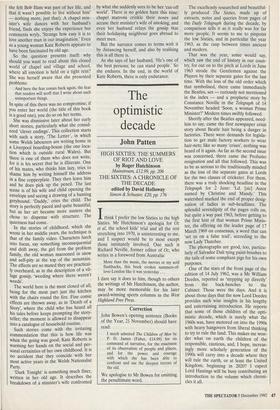The optimistic decade
John Patten
HIGH SIXTIES: THE SUMMERS OF RIOT AND LOVE by Roger Hutchinson Mainstream, £12.99, pp. 206 THE SIXTIES: A CHRONICLE OF THE DECADE edited by David Holloway Simon & Schuster, £20, pp. 176 Ithink I prefer the low Sixties to the high Sixties. Mr Hutchinson's apologia for Oz et al, the school kids' trial and all the rest stretching into 1970, is uninteresting to me, and I suspect would be to most except those intimately involved. One such is Richard Neville, former editor of Oz, who writes in a foreword from Australia:
More than the music, the movies or my acid flashbacks, this book evokes summers-of- love-London like it was yesterday ...
I dare say it does to him, though to others the writings of Mr Hutchinson, the author, may be more memorable for his later award-winning sports columns in the West Highland Free Press. The excellently researched and beautiful- ly produced The Sixties, made up of extracts, notes and queries from pages of the Daily Telegraph during the' decade, by comparison tells it as it really was for far more people. It seems to me to pinpoint the low Sixties, and in particular the year 1963, as the cusp between times ancient and modern.
That was the year, some would say, which saw the end of history in our coun- try, for out on to the pitch at Lords in June 1963 strode the Gentlemen against the Players by their separate gates for the last time. With the loss of the old order which that symbolised, there came immediately the Beatles, sex — curiously not mentioned in the index — and a prophetic story by Constance Noville in the Telegraph of 14 November headed 'Soon, a woman Prime Minister?' Modern times swiftly followed.
Shortly after the Beatles appeared, need- less to say, came the first newspaper crisis story about Beatle hair being a danger in factories. There were demands for legisla- tion to get male factory workers to wear hair-nets; like so many 'crises', nothing was heard of it again. As far as the second issue was concerned, there came the Profumo resignation and all that followed. This was to be as serious to the traditionally minded as the loss of the separate gates at Lords for the two classes of cricketer. For them, there was a truly shocking headline in the Telegraph for 2 June: 'Li [sic] Astor named by Christine and Mandy.' This watershed marked the end of proper desig- nation of ladies in sub-headlines. The splendid serendipity of the pages rolls on, but quite a way past 1963, before getting to the first hint of that woman Prime Minis- ter, the offering on the leader page of 17 March 1969 on consensus, a word that can 'set us on a false trail', according to the now Lady Thatcher.
The photographs are good, too, particu- larly of Salvador Dali tying paint-brushes to the tails of some compliant pigs for his own purposes.
One of the stars of the front page of the edition of 14 July 1962, was a Mr William Deedes, reported as 'stepping up directly' from the back-benches to the Cabinet. Those were the days. And it is about those days that the now Lard Deedes provides such wise insights in his lengthy and entertaining introduction. He reports that some of those children of the opti- mistic decade, which is surely what the 1960s was, have motored on into the 1990s with heavy hangovers from liberal thinking to try to rule the land. This makes me won- der what on earth the children of the responsible, cautious, and, I hope, increas- ingly more scholarly generation of the 1990s will carry into a decade where they will rule the earth, or at least the United Kingdom, beginning in 2020? I expect Lord Hastings will be busy contributing an introduction to the volume which chroni- cles it all.










































































 Previous page
Previous page